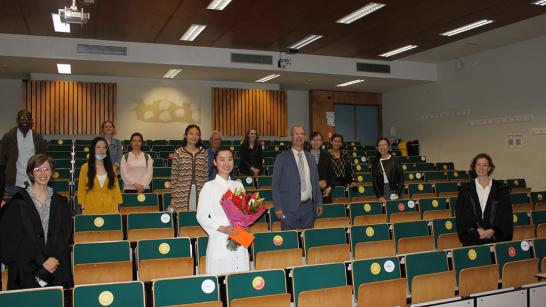
We are pleased to announce that on 28 June 2021, Lingyu Xu successfully defended her PhD thesis entitled “Which factors have driven China's development of a more comprehensive policy approach”. The PhD defence started with a welcome note by Prof. Trisha Meyer who acted as a Chair. After Lingyu’s presentation of her PhD, jury proceeded with their questions. Members of the jury were Prof. Eric Florence (Université de Liège), Prof. Stefanie Weil (Antwerp Management School & University of Antwerp), and Prof. Kristin Henrard (Brussels School of Governance), while Lingyu’s co-supervisors were Professors Florian Trauner and Ilke Adam. The PhD defence was concluded by a speech from Lingyu in which she thanked her supervisors, colleagues and her family.
The Brussels School of Governance would like to congratulate to Dr. Xu on this achievement! Below you can read more about her PhD thesis.
Abstract:
Most scholars consider China as a country where people migrate from. Contrary to this conventional view, this thesis discusses the policy of China as a country of immigration. It tries to find answers to the question as to why China’s immigration policy has changed from a very restrictive policy to a more open (albeit still highly selective) and flexible one. From a theoretical angle, it looks at the migration theories that have been applied in the West (neo-institutionalism, political economy and constructivism) and explores whether these theories are also applicable for the case of China. Three different migrant groups are scrutinized: high-level talents, ordinary foreigners and irregular migrants.
The thesis uses the method of a structured and focused comparison and builds upon three case studies: (1) foreign talent policies in Beijing, (2) ordinary foreigner policies in Yiwu and (3) irregular immigration policies in Guangzhou. These cases highlight the factors driving policy changes vis-à-vis these types of migration in China.
This PhD thesis gives an extensive overview of China’s immigration policies over the past four decades, focusing initially on Exit & Entry only, and then gradually dealing with foreigners’ integration. One group of migrants – foreign talents – has been treated in a preferential way from the beginning up until now. The research reveals that institutional factors are mainly responsible for this change. Processes of globalization, reformed institutional structures, the rise of (non-governmental) social groups, and court actions have also been very important in terms of understanding as to why these changes have taken place. Wider societal norms help better understand the crucial moments of change.
This thesis shows that migration theories tested in liberal Western democracies may still prove to be of relevance in a ‘non-Western’ context such as China, provided they are adapted and thoroughly tested.